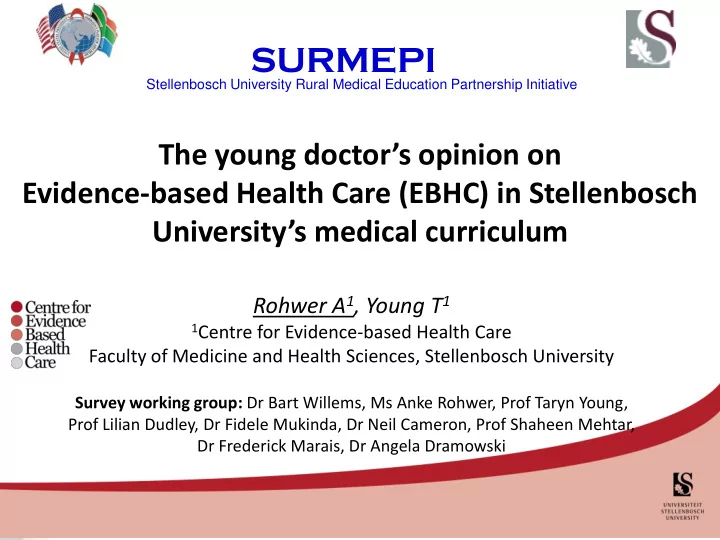

SURMEPI Stellenbosch University Rural Medical Education Partnership Initiative The young doctor’s opinion on Evidence-based Health Care (EBHC) in Stellenbosch University’s medical curriculum Rohwer A 1 , Young T 1 1 Centre for Evidence-based Health Care Faculty of Medicine and Health Sciences, Stellenbosch University Survey working group: Dr Bart Willems, Ms Anke Rohwer, Prof Taryn Young, Prof Lilian Dudley, Dr Fidele Mukinda, Dr Neil Cameron, Prof Shaheen Mehtar, Dr Frederick Marais, Dr Angela Dramowski
SURMEPI Stellenbosch University Rural Medical Education Partnership Initiative Themes: – Increasing capacity and quality of medical doctors – Retention of graduates – Regionally relevant research
Lancet report on training health professionals for the 21 st century ( Frenk 2010) Competency-based education model Health needs Competencies Curriculum Health system Outcomes Assessment
Curriculum development: Kern’s six steps 1. Problem identification and general needs assessment 2. Needs assessment 6. Evaluation and Health Ideal of targeted learners feedback care approach problem 3. Goals and specific 5. Implementation measurable objectives Current General approach needs 4. Educational strategies assessment
Approach to situational analysis of medical curriculum • Fragmented teaching of EBHC • Not integrated into clinical modules Document review Survey of Interviews recent with graduates lecturers
Aim of study: • To gather perspectives of recently qualified doctors regarding the appropriateness of EBHC teaching throughout their undergraduate education.
Methods • Electronic questionnaire (SUN surveys) • Quantitative and qualitative questions • Recent graduates (2004-2010) invited by email • Poor response rate required incentive • Quantitative results analysed with SSPS • Qualitative responses coded with Atlas.ti (emerging themes)
Results To what extent were the following topics Not at all Inadequate Basic Adequate Comprehensive Total on EBHC covered in the n (%) n (%) n (%) n (%) n (%) n (%) • Response rate: 38% (375/980) SU MB, ChB curriculum? Identifying a personal gap in knowledge 11 (5.0) 30 (13.5) 87 (39.2) 88 (39.6) 6 (2.7) 222 (100) • Respondents: Formulating an answerable research 16 (7.2) 40 (18.1) 87 (39.4) 68 (30.8) 10 (4.5) 221 question using the PICO process (100) – Medical officers (29%) Developing a search strategy based on the 14 (6.4) 41 (18.7) 77 (35.2) 74 (33.8) 13 (5.9) 219 PICO question (100) Doing a thorough literature search related 3 (1.4) 35 (15.8) 67 (30.3) 91 (41.2) 25 (11.3) 221 (100) – Registrars (24%) to a question you have Distinguishing between different types of 1(0.5) 22 (10.0) 62 (28.1) 97 (43.9) 39 (17.6) 221(100) – Interns (14%) studies Identifying study designs relevant to a 1 (0.5) 29 (13.2) 73 (33.3) 87 (39.7) 29 (13.2) 219 question (100) – Community service doctors (14%) Critically appraising the quality of 1 (0.5) 36 (16.3) 76 (34.4) 90 (40.7) 18 (8.1) 221 (100) different study designs – General practitioners (13%) Interpreting the results of studies 2 (0.9) 32 (14.5) 86 (38.9) 82 (37.1) 19 (8.6) 221 (100) Applying the findings to your clinical 2 (0.9) 28 (12.7) 76 (34.4) 96 (43.4) 19 (8.6) 221 • Quantitative results setting by considering the evidence, your (100) own clinical experience and individual patients Evaluating the process of EBHC on an on- 1 (0.5) 38 (17.2) 100 72 (32.6) 10 (4.5) 221 going basis (45.2)
Qualitative results • EBHC Teaching in the medical curriculum – EBHC skills – Approach to teaching EBHC • Challenges experienced in practice
Limitations • No objective testing of EBHC skills and knowledge • Quantitative results contradictory with qualitative results – Consider using mainly open-ended questions in such surveys
Bottom line “The hardest conviction to get into the mind of a beginner is that the education • Results echo document review results: upon which he is engaged is – EBHC teaching at SU currently not adequate – Concentrated in Family Medicine modules not … a medical course, • Graduates lack EBHC skills • Need for integrated teaching and learning of but a life course, EBHC for which the work of a few years under • Biggest challenge in practicing EBHC: access to teachers is but a preparation.” information • Interviews with lecturers will further Sir William Osler, The Student of Medicine supplement findings
http://www.cebhc.co.za www.facebook.com/cebhc Acknowledgements: • EBHC project team at Stellenbosch University • EBHC task team • Funding from the U.S. President's Emergency Plan for AIDS Relief through HRSA via MEPI is gratefully acknowledged http://surmepi.sun.ac.za SURMEPI Stellenbosch University Rural Medical Education Partnership Initiative
Recommend
More recommend